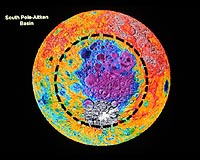|
|
|
Maximizing Scientific Return Of The Moon Rovers Tucson AZ (SPX) Jul 28, 2009  NASA and other national space agencies are again focused on lunar exploration, which raises the question of how to best use semi-autonomous rovers to explore the Moon's surface. R. Aileen Yingst, a senior scientist at the Tucson-based Planetary Science Institute, is leading a group of Mars-rover veterans who are conducting field studies to answer that question. The scientists are ... read more
NASA and other national space agencies are again focused on lunar exploration, which raises the question of how to best use semi-autonomous rovers to explore the Moon's surface. R. Aileen Yingst, a senior scientist at the Tucson-based Planetary Science Institute, is leading a group of Mars-rover veterans who are conducting field studies to answer that question. The scientists are ... read moreNew Sunscreen For ISRO's Manned Mission  Bangalore, India (SPX) Jul 27, 2009
Bangalore, India (SPX) Jul 27, 2009The intense radiation from the sun that roasted India's first unmanned lunar satellite's key orientation instrument - the star sensor - has raised concerns over the safety of Indian astronauts on the country's first manned space flight, planned around 2015. A scientist from the Indian Space Research Organisation (ISRO) pointed out that radiation can kill astronauts if the emissions from ... more
|
Vietnam says parched Red River at record low
China to be world's third biggest wind power producer: media Cost-cutting NASA eyes three cheap space missions Honduras declares state of emergency amid drought Russia in secret plan to save Earth from asteroid: official Sarkozy scrambles to salvage carbon tax French carbon tax ruled illegal Brazil's Lula signs law cutting CO2 emissions 2009 a 'benign' year of natural disasters: German re-insurer Greenpeace Spain demands Denmark release its director
| |||||||||||||||
| Previous Issues | Jul 27 | Jul 26 | Jul 24 | Jul 23 | Jul 22 |
| . |
Tiny Saturn Moon Could Be Targeted In Search For ET Life Tempe AZ (SPX) Jul 24, 2009
Tempe AZ (SPX) Jul 24, 2009Plumes spewing from a tiny moon of Saturn - a moon roughly the width of Arizona - are filled with molecules that suggest that the moon, Enceladus, is likely another place in the solar system to look for life, Cassini scientist Jonathan Lunine of The University of Arizona Lunar and Planetary Laboratory said. When NASA's Cassini spacecraft flew through a plume erupting from Enceladus early ... more Things You Never Knew About The First Moon Landing  Canberra, Australia (SPX) Jul 24, 2009
Canberra, Australia (SPX) Jul 24, 2009Forty years ago this month a mighty Saturn-5 rocket blasted off with the force of one hundred locomotives propelling two men into history! They became the first human beings to ever set foot on another world. This was the first Moon landing. No-one had ever done this before. Would they land OK? Would they crash? Would they sink into the lunar soil? NASA gave them a 50-50 chance at best. ... more 40 Years On, Renaissance Begins For Lunar Exploration  Tucson AZ (SPX) Jul 23, 2009
Tucson AZ (SPX) Jul 23, 2009The 40th anniversary of the Apollo lunar landing is a time to look back and, especially, an opportunity to look forward to future space exploration, including the Moon missions now being planned by NASA and other space agencies, said Mark A. Bishop, an associate research scientist with the Tucson-based Planetary Science Institute. Bishop talked with commentators Matthew Abraham and David B ... more |
. |
| . |
LROC's First Look At The Apollo Landing Sites Tempe AZ (SPX) Jul 21, 2009
Tempe AZ (SPX) Jul 21, 2009The imaging system on board NASA's Lunar Reconnaissance Orbiter (LRO) recently had its first of many opportunities to photograph the Apollo landing sites. The Lunar Reconnaissance Orbiter Camera (LROC) imaged five of the six Apollo sites with the narrow angle cameras (NACs) between July 11 and 15, within days of the 40th anniversary of the Apollo 11 mission. The early images obtained by ... more Google adds Moon to online Earth map service  San Francisco (AFP) July 20, 2009
San Francisco (AFP) July 20, 2009Google on Monday marked the 40th anniversary of the first human footstep on the moon by adding virtual lunar exploration to its free online Earth map and imagery service. The moon joins Earth, Mars, and Sky in an options list in an upper tool bar on the main Web page at earth.google.com. Aspiring lunar explorers will need Google Earth 5.0 software, which can be downloaded free. Apollo 11 ... more Indian First Moon Mission May Meet A Premature End  New Delhi, India (PTI) Jul 21, 2009
New Delhi, India (PTI) Jul 21, 2009India may have to abandon its Moon mission midway, launched in October with a two-year shelf life, as its indigenous first lunar craft Chandrayaan-I lost a vital sensor which could lead to a premature end, the Indian Space Research Organization (ISRO) said Friday. "Unfortunately, during the last month we have lost a vital sensor - the star sensor. Like in the olden days when one used to ... more |
. |
| Previous Issues | Jul 27 | Jul 26 | Jul 24 | Jul 23 | Jul 22 |
| The contents herein, unless otherwise known to be public domain, are Copyright 1995-2009 - SpaceDaily. AFP and UPI Wire Stories are copyright Agence France-Presse and United Press International. ESA Portal Reports are copyright European Space Agency. All NASA sourced material is public domain. Additional copyrights may apply in whole or part to other bona fide parties. Advertising does not imply endorsement, agreement or approval of any opinions, statements or information provided by SpaceDaily on any web page published or hosted by SpaceDaily. Privacy statement |